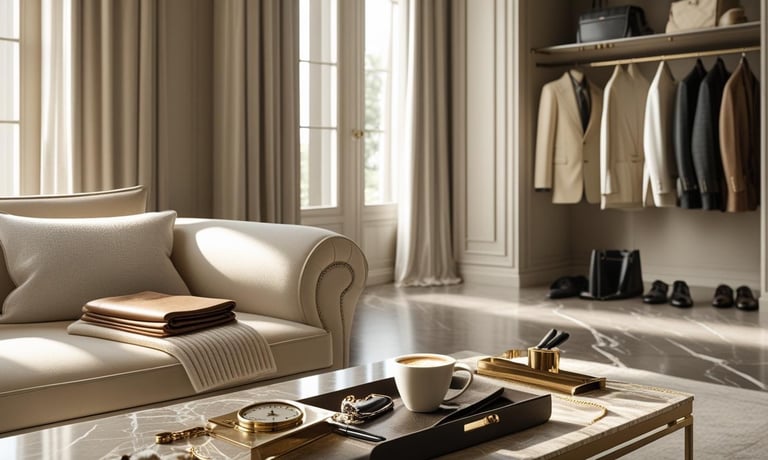The Psychology of Luxury: Quality Over Quantity
LIFESTYLE
By Sia Imime
3/19/20253 min read


Disclosure: This article contains affiliate links, meaning that if you purchase through them, I may earn a small commission at no extra cost to you. I only recommend products that I believe will add value to your personal growth journey.
Luxury has always been a symbol of status, power, and refined taste. But beyond the surface, the psychology of luxury goes much deeper. From cognitive biases to emotional satisfaction, the science behind why we choose quality over quantity reveals fascinating insights into human behavior. This article explores why investing in high-quality items leads to greater fulfillment, sustainability, and even better financial decisions.
The Science Behind Luxury and Human Psychology
Luxury isn’t just about extravagance; it’s deeply rooted in psychology. Multiple studies confirm that high-quality products enhance not only material satisfaction but also mental well-being.
The Perception of Value: Why Expensive Feels Better
According to a 2008 study published in the Journal of Marketing Research, people perceive higher-priced items as more effective and desirable—even when they’re identical to cheaper alternatives. This phenomenon, known as the price-placebo effect, explains why a $200 bottle of wine may taste better to someone than a $20 one, even if blind testing shows no difference.
This psychological bias extends beyond wine. Luxury fashion, watches, and skincare all benefit from this effect, making people feel more confident and satisfied when they choose high-end items.
My Pick: Treat yourself to a high-end silk pillowcase for better skin and hair while experiencing luxury in your sleep.
Dopamine and Emotional Satisfaction in Luxury Purchases
A study from the University of Minnesota found that luxury purchases activate the brain’s dopaminergic reward system—the same system that responds to delicious food or winning a competition. This means that buying a quality handbag or premium cologne isn’t just about aesthetics; it’s a neurochemical boost to your confidence and happiness.
Symbolism and Identity: The Luxury You Choose Reflects Who You Are
Renowned psychologist Carl Jung explored the idea that what we own shapes our identity. In luxury psychology, this means that investing in timeless, high-quality items communicates self-respect and a sense of personal achievement. A handcrafted leather bag or an artisanal watch isn't just an accessory—it’s a statement of refined taste and longevity.
My Pick: Elevate your everyday elegance with a genuine leather garment bag that lasts for years.
Why Quality Over Quantity Matters in the Long Run
1. Longevity and Sustainability
Fast fashion and mass-produced goods may seem like a bargain, but they often wear out quickly, leading to frequent replacements and excessive waste. A 2021 report from the Ellen MacArthur Foundation estimates that the fashion industry generates over 92 million tons of waste annually due to low-quality products.
Investing in high-quality, durable items means fewer replacements and a lower environmental footprint. Minimalism meets luxury when quality takes precedence over quantity.
2. Financial Wisdom: The Cost-Per-Wear Formula
Many people hesitate to buy luxury because of the initial cost, but a smarter way to think about spending is the cost-per-wear formula. A $500 coat worn 100 times costs only $5 per wear, while a $50 coat worn only 5 times costs $10 per wear—making the luxury item the better financial choice in the long run.
My Pick: Consider investing in a cashmere sweater for Women / cashmere sweater for Men that remains stylish and durable year after year.
3. Psychological Comfort: Decluttering the Mind
Studies in neuroscience suggest that clutter increases stress and reduces cognitive performance. A 2011 study by Princeton University Neuroscience Institute found that excessive visual stimuli can decrease focus and mental clarity.
By opting for fewer, well-crafted items instead of many disposable ones, you create a serene, clutter-free space that enhances productivity and mental peace.
My Pick: Organize your essentials with an elegant leather desk organizer for a touch of sophistication in your workspace.
How to Shift Your Mindset Towards Quality
1. Embrace Slow Luxury
The concept of slow luxury encourages mindful purchasing—focusing on well-made, sustainable items instead of impulse shopping. Research from Harvard Business Review suggests that conscious shopping leads to a stronger sense of fulfillment and self-control.
2. Cultivate a Signature Style
Fashion psychologists emphasize the importance of a curated wardrobe filled with timeless essentials. Instead of chasing trends, invest in classic, high-quality pieces that exude elegance and last decades.
My Pick: Upgrade your style with a classic stainless-steel watch for Women / classic stainless-steel watch for Men — a staple for every sophisticated wardrobe.
3. Shift from Owning to Experiencing
A luxury lifestyle doesn’t always mean buying more—it can also mean investing in experiences over objects. Studies by Cornell University show that people derive greater long-term happiness from experiences rather than material possessions. A well-curated travel experience or a gourmet dining event often holds more value than accumulating possessions.
Conclusion: The Luxury of Mindful Living
Luxury is more than just price tags and brand names—it’s about quality, longevity, and emotional satisfaction. Science backs up the idea that investing in fewer, high-quality items leads to better financial decisions, improved well-being, and even a reduced environmental impact.
By embracing the psychology of luxury, you cultivate a life of elegance, purpose, and intentionality—where every purchase is a conscious reflection of your values.
Tags: luxury psychology, quality over quantity, mindful living, sustainable luxury, emotional satisfaction, high-end lifestyle, dopamine and shopping, cost-per-wear, timeless fashion, minimalist elegance
